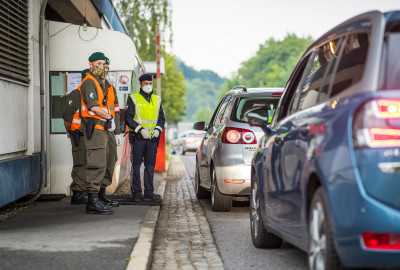How to Get Into Austria as of May 19
In line with the opening steps in Austria, the government has announced new entry regulations, which should ease the travel to Austria. Read all about the regulations below!
 Travelling to Austria will be easier as of May 19, 2021. / Picture: © BMI Bundesministerium für Inneres / Gerd Pachauer
Travelling to Austria will be easier as of May 19, 2021. / Picture: © BMI Bundesministerium für Inneres / Gerd Pachauer
Austria will be having new entry regulations as of tomorrow, May 19, 2021.
Health Minister Wolfgang Mückstein stated: "In many states, the infection figures are declining, so we can also implement facilitations for entry into Austria in parallel with the opening steps in the country."
Similar to the entry regulations for restaurants, body-related services and the cultural sector, successful entry into Austria depends on the following three possibilities ("3-G-Nachweis"; "3-G" standing for "geimpft, getested, genesen", which translates to "vaccinated, tested or recovered"): proof of vaccination, testing or recovery is a prerequisite for any type of entry.
"All vaccinations that have been approved by the EMA or have successfully passed the corresponding process of the WHO are recognized as proof of vaccination. Entry from high-incidence areas must also undergo quarantine, and even stricter rules apply to virus-variant countries," stated Mückstein.
The latest amendment to the entry regulation provides for three new categories:
1. Entry from states with low incidence of infection: 3-G rule, no quarantine.
A 3-G certificate is required for entry. If this cannot be presented, a test must be carried out immediately, or at least within 24 hours. As vaccination proof counts a document issued in German or English (e.g. yellow vaccination certificate) about a vaccination that has been approved by the EMA or has successfully passed the EUL process of the WHO. A recovery certificate is a medical or official confirmation (e.g. segregation notice) in German or English language about an infection survived in the past six months. Equivalent to the recovery certificate is a proof of neutralizing antibodies, which must not be older than 3 months at the time of entry.
The following countries are currently considered as countries with low incidence:
Andorra, Australia, Belgium, Bulgaria, Czech Republic, Denmark, Estonia, Finland, France, Germany, Principality of Liechtenstein, Greece, Hungary, Iceland, Ireland, Israel, Italy, Latvia, Luxembourg, Malta, Monaco, New Zealand, Norway, Poland, Portugal, Romania, San Marino, Singapore, Slovakia, Slovenia, Spain, Switzerland, South Korea, Vatican.
2. Entry from high risk countries: 3-G rule, test with quarantine mandatory.
3-G certificate must be presented. If no proof is carried, a test must be carried out immediately, but in any case within 24 hours.
Vaccinated or recovered persons do not have to enter quarantine when entering from risk countries, but tested persons do. This quarantine can be terminated from day 5 after entry (day of entry = 0) with a new negative test result.
These countries currently comprise Croatia, Cyprus, Lithuania, Netherlands, and Sweden.
3. Entry from virus variant states: PCR test and quarantine mandatory.
Entry from virus variant states (currently Brazil, India and South Africa) is, as before, only possible to a very limited extent. Essentially, only Austrian citizens and persons with residence or habitual abode in Austria are allowed to enter. Entry for humanitarian reasons or in the compelling interest of the Republic is also possible.
For persons entering from a virus variant area or who have stayed in such an area in the past ten days, the following applies as before: entry is only possible with a negative molecular biological test result (e.g. PCR). The testing obligation also applies to vaccinated and recovered persons. Austrians and persons residing in Austria who have been in a virus-variant country in the past 10 days are allowed to enter the country, but must take a follow-up PCR test within 24 hours. This is controlled by the health authorities.
The no-landing order for aircraft from South Africa, Brazil and India has been extended up to and including June 6.
Entry from other countries that are not part of the three lists is generally prohibited and, as before, is only possible in exceptional cases - for example, for work or study purposes.
In any case, a 3-G certificate must be presented upon entry. Vaccinated or recovered persons do not have to enter quarantine, but tested persons do. This quarantine can be terminated from day 5 after entry (day of entry = 0) with a new negative test result.
The exceptions for commuters remain unchanged and still do not apply to entry from virus variant areas.
Children 10 years of age and older must be tested. In principle, the quarantine obligation also applies to children, but is waived if the parents or guardians are exempt from quarantine.
In principle, electronic registration at https://entry.ptc.gv.at/en is required before each entry. This must be done at the earliest 72 hours before entry, commuters must renew it every 28 days.
The amendment to the entry regulation comes into force at midnight on Wednesday, 19 May, and is initially valid until June 30, 2021.



